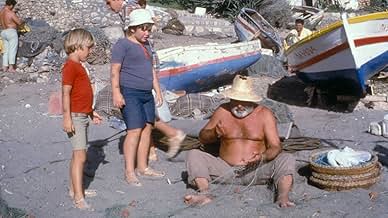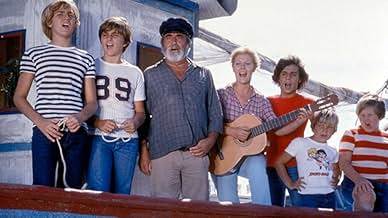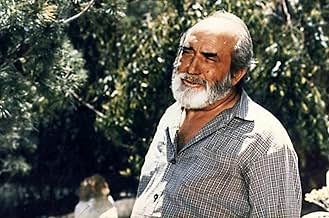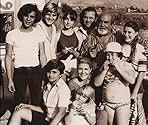Verano azul
- Série télévisée
- 1981–1982
- 50m
ÉVALUATION IMDb
7,8/10
1,3 k
MA NOTE
Ajouter une intrigue dans votre langueThis series follows the adventures of a group of teenagers during their summer vacation in a small town on the southern coast of Spain.This series follows the adventures of a group of teenagers during their summer vacation in a small town on the southern coast of Spain.This series follows the adventures of a group of teenagers during their summer vacation in a small town on the southern coast of Spain.
- Prix
- 2 victoires et 3 nominations au total
Parcourir les épisodes
Histoire
Le saviez-vous
- AnecdotesAs of 2006 this one is considered to be the all-time most successful TV series in Spain, with an estimated peak audience of 20 million viewers when it was first aired (a 38 million inhabitants country by then), so far it has been re-run 11 times in different Spanish TV channels and sold by TVE to many other countries (which is quite uncommon). Besides its 25th Anniversary edition DVD package has been one of the most successful in the Spanish video market in 2006.
- ConnexionsFeatured in Muertos de risa (1999)
Commentaire en vedette
To those of us who were kids or teenagers in the early 80s in Spain, "Verano Azul" –or Blue Summer, in a literal English translation- brings back many fond memories of what our childhood/adolescence was like.
There were two TV channels only, no home computers, play-stations, i-pods or mobile phones. And we kids would spend the whole day in the street playing ball, marbles, hide-and-seek, catch-me-if-you-can and many other games that are now extinct. Or we would pop to the local bar to play the pinball machines while having a Coke or a Fanta. We used to read Spanish comics, ride our bikes or play charades, and always had a great time. Also in those days summers were proper summers, before climate change came to screw things up. Our school summer vacation ran from mid-June to mid-September, and you hardly would see a rainy day in between. I hadn't seen the series for almost twenty years now, and when these past few days I had the chance of watching it again, my eyes filled with tears. I have been watching as many as three or four episodes every day, and couldn't get enough. Many things that I had forgotten suddenly popped back in my memory in that so well know effect that gives us the feeling that it happened only yesterday. I realise now how good this series really is because it is so realistic and well-made, with absolutely credible performances –those kids had real talent, they did-, typical teenage problems and situations within the context of the era, cultural icons, and the humour provided by Tito and Pirana, the youngest members of the gang. Because I am the same age as the actor who plays Tito, seeing him now is like seeing myself thirty years ago. These two cheeky kids always steal the show with their lines and with the innocent and plucky things they do.
I knew that the series had been a huge success in South-America but I had no idea about Bulgaria and Poland, and the reviews posted by people from these two countries have left me amazed. They say the show gave them one of the very first glimpses of the West and what kids were like in the free world, and they also say that the minute it would start on TV the streets became empty. I would have never imagined it.
This series is perfect in every way, and it is a good thing they never made a sequel (the typical thing with the youngsters returning to the village two or three years later and getting together again) because it surely could never be as good as the original.
There is a Spanish saying that goes "Good things, if they are brief, they are twice as good".
And it is true.
There were two TV channels only, no home computers, play-stations, i-pods or mobile phones. And we kids would spend the whole day in the street playing ball, marbles, hide-and-seek, catch-me-if-you-can and many other games that are now extinct. Or we would pop to the local bar to play the pinball machines while having a Coke or a Fanta. We used to read Spanish comics, ride our bikes or play charades, and always had a great time. Also in those days summers were proper summers, before climate change came to screw things up. Our school summer vacation ran from mid-June to mid-September, and you hardly would see a rainy day in between. I hadn't seen the series for almost twenty years now, and when these past few days I had the chance of watching it again, my eyes filled with tears. I have been watching as many as three or four episodes every day, and couldn't get enough. Many things that I had forgotten suddenly popped back in my memory in that so well know effect that gives us the feeling that it happened only yesterday. I realise now how good this series really is because it is so realistic and well-made, with absolutely credible performances –those kids had real talent, they did-, typical teenage problems and situations within the context of the era, cultural icons, and the humour provided by Tito and Pirana, the youngest members of the gang. Because I am the same age as the actor who plays Tito, seeing him now is like seeing myself thirty years ago. These two cheeky kids always steal the show with their lines and with the innocent and plucky things they do.
I knew that the series had been a huge success in South-America but I had no idea about Bulgaria and Poland, and the reviews posted by people from these two countries have left me amazed. They say the show gave them one of the very first glimpses of the West and what kids were like in the free world, and they also say that the minute it would start on TV the streets became empty. I would have never imagined it.
This series is perfect in every way, and it is a good thing they never made a sequel (the typical thing with the youngsters returning to the village two or three years later and getting together again) because it surely could never be as good as the original.
There is a Spanish saying that goes "Good things, if they are brief, they are twice as good".
And it is true.
- Rueiro
- 12 juin 2013
- Lien permanent
Meilleurs choix
Connectez-vous pour évaluer et surveiller les recommandations personnalisées
- How many seasons does Verano azul have?Propulsé par Alexa
Détails
Contribuer à cette page
Suggérer une modification ou ajouter du contenu manquant

Lacune principale
By what name was Verano azul (1981) officially released in Canada in English?
Répondre
![Regarder Promo [OV]](https://m.media-amazon.com/images/M/MV5BY2IxOGE5NGEtOGU2OS00NmE2LTkyZGEtN2ZiYTdmZGY0ZDYzXkEyXkFqcGdeQWdhbWF6b2E@._V1_QL75_UX500_CR0)



















